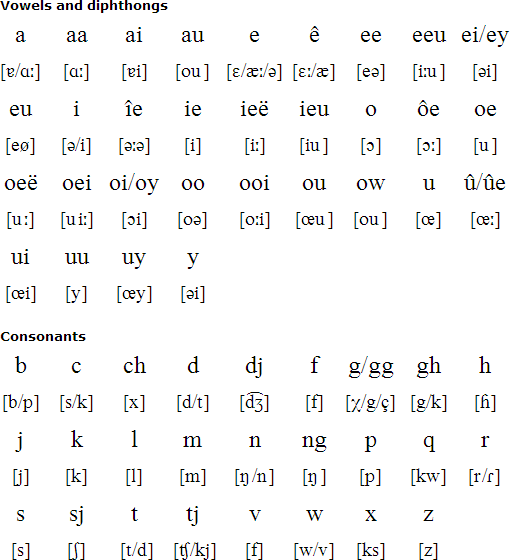domingo, 4 de diciembre de 2011
Afrikans
Afrikaans
Afrikaans is a Low Franconian West Germanic language descended from Dutch and spoken mainly in South Africa and Namibia. There are also speakers of Afrikaans in Australia, Belgium, Botswana, Canada, Germany, Lesotho, Malawi, Namibia, the Netherlands, New Zealand, the UK, the USA, Zambia and Zimbabwe. About 10 million people speak Afrikaans as a first or second language, and several million other have a basic knowledge of the language.Afrikaans retains some features of 18th century Dutch, together with vocabulary from various Bantu and Khoisan languages and also from Portugese and Malay. Speakers of Afrikaans can understand Dutch, though Dutch speakers tend to need a while to tune into Afrikaans.
From about 1815 Afrikaans started to replace Malay as the language of instruction in Muslim schools in South Africa. At that time it was written with the Arabic alphabet. Afrikaans, written with the Latin alphabet, started to appeared in newspapers and political and religious works in about 1850. Then in 1875 a group of Afrikaans speakers from the Cape formed the Genootskap vir Regte Afrikaanders (Society for Real Afrikaners), and published a number of books in Afrikaans, including grammars, dictionaries, religious material and histories. They also published a journal called the Patriot.
During the early years of the 20th century there was a blossoming of academic interest in Afrikaans. In 1925 Afrikaans was recognised by the government as a real language, instead of a slang version of Dutch. Afrikaans has changed little since then.
| A a | B b | C c | D d | E e | F f | G g | H h | I i |
|---|---|---|---|---|---|---|---|---|
| aa | bee | see | dee | ee | ef | gee | haa | ie |
| J j | K k | L l | M m | N n | O o | P p | Q q | R r |
| jee | kaa | el | em | en | oo | pee | kuu | er |
| S s | T t | U u | V v | W w | X x | Y y | Z z | |
| es | tee | uu | vee | wee | ex | y | set |
Afrikaans pronunciation

Sample text in Afrikaans
Alle menslike wesens word vry, met gelyke waardigheid en regte, gebore. Hulle het rede en gewete en behoort in die gees van broederskap teenoor mekaar op te tree.Beowulf
Original Text | |
Now Beowulf bode in the burg of the Scyldings, leader beloved, and long he ruled in fame with all folk, since his father had gone away from the world, till awoke an heir, haughty Healfdene, who held through life, sage and sturdy, the Scyldings glad. Then, one after one, there woke to him, to the chieftain of clansmen, children four: Heorogar, then Hrothgar, then Halga brave; and I heard that—was—’s queen, the Heathoscylfing’s helpmate dear. To Hrothgar was given such glory of war, such honor of combat, that all his kin obeyed him gladly till great grew his band of youthful comrades. It came in his mind to bid his henchmen a hall uprear, ia master mead-house, mightier far than ever was seen by the sons of earth, and within it, then, to old and young he would all allot that the Lord had sent him, save only the land and the lives of his men. Wide, I heard, was the work commanded, for many a tribe this mid-earth round, to fashion the folkstead. It fell, as he ordered, in rapid achievement that ready it stood there, of halls the noblest: Heorot he named it whose message had might in many a land. Not reckless of promise, the rings he dealt, treasure at banquet: there towered the hall, high, gabled wide, the hot surge waiting of furious flame. Nor far was that day when father and son-in-law stood in feud for warfare and hatred that woke again. With envy and anger an evil spirit endured the dole in his dark abode, that he heard each day the din of revel high in the hall: there harps rang out, clear song of the singer. He sang who knew tales of the early time of man, how the Almighty made the earth, fairest fields enfolded by water, set, triumphant, sun and moon for a light to lighten the land-dwellers, and braided bright the breast of earth with limbs and leaves, made life for all of mortal beings that breathe and move. So lived the clansmen in cheer and revel a winsome life, till one began to fashion evils, that field of hell. Grendel this monster grim was called, march-riever mighty, in moorland living, in fen and fastness; fief of the giants the hapless wight a while had kept since the Creator his exile doomed. On kin of Cain was the killing avenged by sovran God for slaughtered Abel. Ill fared his feud, and far was he driven, for the slaughter’s sake, from sight of men. Of Cain awoke all that woful breed, Etins and elves and evil-spirits, as well as the giants that warred with God weary while: but their wage was paid them! |
viernes, 2 de diciembre de 2011
jueves, 20 de octubre de 2011
Suscribirse a:
Comentarios (Atom)